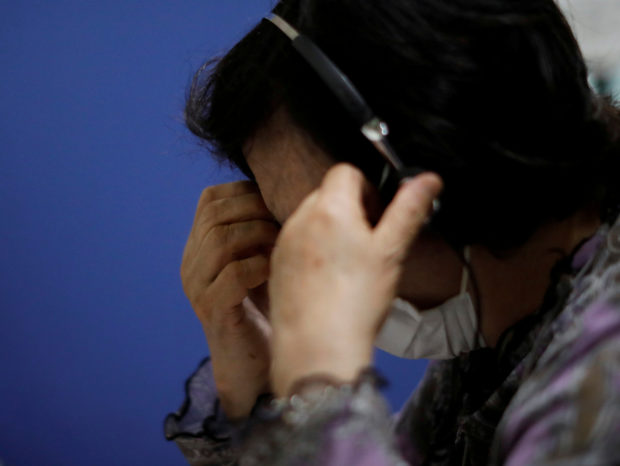Japan’s suicides jump 16% in Covid-19 2nd wave after fall in 1st wave — study

A volunteer responds an incoming call at the Tokyo Befrienders call center, a Tokyo’s suicide hotline center, during the spread of the coronavirus disease, in Tokyo, Japan May 26, 2020. (Reuters)
TOKYO — Suicide rates in Japan have jumped in the second wave of the Covid-19 pandemic, particularly among women and children, even though they fell in the first wave when the government offered generous handouts to people, a survey found.
The July-October suicide rate rose 16% from the same period a year earlier, a stark reversal of the February-June decline of 14%, according to the study by researchers at Hong Kong University of Science and Technology and Tokyo Metropolitan Institute of Gerontology.
“Unlike normal economic circumstances, this pandemic disproportionately affects the psychological health of children, adolescents and females (especially housewives),” the authors wrote in the study published on Friday in the journal Nature Human Behaviour.
The early decline in suicides was affected by such factors as government subsidies, reduced working hours and school closure, the study found.
But the decline reversed — with the suicide rate jumping 37% for women, about five times the increase among men — as the prolonged pandemic hurt industries where women predominate, increasing the burden on working mothers, while domestic violence increased, the report said.
The study, based on health ministry data from November 2016 to October 2020, found the child suicide rate spiked 49% in the second wave, corresponding to the period after a nationwide school closure.
Prime Minister Yoshihide Suga this month issued a Covid-19 state of emergency for Tokyo and three surrounding prefectures in a bid to stem the resurgence. He expanded it this week to seven more prefectures, including Osaka and Kyoto.
Taro Kono, administrative and regulatory reform minister, told Reuters on Thursday that while the government would consider extending the state of emergency, it “cannot kill the economy.”
“People worry about Covid-19. But a lot of people have also committed suicide because they have lost their jobs, they have lost their income and couldn’t see the hope,” he said. “We need to strike the balance between managing Covid-19 and managing the economy.”
For more news about the novel coronavirus click here.
What you need to know about Coronavirus.
For more information on COVID-19, call the DOH Hotline: (02) 86517800 local 1149/1150.
The Inquirer Foundation supports our healthcare frontliners and is still accepting cash donations to be deposited at Banco de Oro (BDO) current account #007960018860 or donate through PayMaya using this link.
If you or someone you know is in need of assistance, please reach out to the National Center for Mental Health (NCMH). Their crisis hotlines are available at 1553 (Luzon-wide landline toll-free), 0917-899-USAP (8727), 0966-351-4518, and 0908-639-2672. For more information, visit their website: (https://doh.gov.ph/NCMH-Crisis-Hotline)
Alternatively, you can contact Hopeline PH at the following numbers: 0917-5584673, 0918-8734673, 88044673. Additional resources are available at ngf-mindstrong.org, or connect with them on Facebook at Hopeline PH.


















